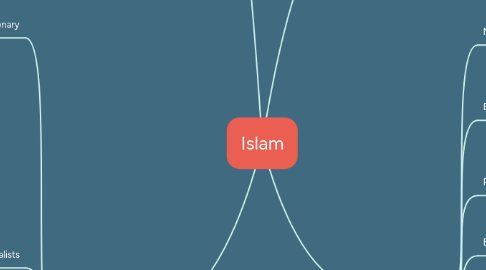
1. Branches of Faith
1.1. Sunni
1.1.1. Countries that hold the majority:
1.1.1.1. Syria
1.1.1.2. Saudi Arabia
1.1.1.3. Iraq
1.1.1.4. Turkey
1.1.2. Make up 80% of the Muslim world.
1.1.3. Lack ant devout political beliefs in their religious leaders.
1.1.4. Don't regard much importance to the blood relationship between Muhammad and his descendants.
1.2. Shia
1.2.1. Countries that hold the majority:
1.2.1.1. Iran
1.2.2. More structured and have a firm devotion to the blood relationship between Muhammad and his descendants.
1.2.3. Believe in the return of the Imams (descendants) and that until then religious leaders should govern the Islamic world.
2. Politics
2.1. Revolutionary
2.1.1. Anti-Secularization
2.1.2. Strict adherence to Sharia in all matters.
2.1.3. Active in both violent & non-violent means.
2.1.4. Justifies actions in beliefs and interpretations of Islam.
2.1.5. Revolutionary leaders:
2.1.5.1. Osama bin Laden
2.1.5.2. Muhammad ibn Abd al-Wahhad
2.1.5.3. Ayatollah Ruhollal Khomeini
2.1.5.4. Sayyid Qutb
2.2. Traditionalists
2.2.1. Prefer a government similar to a theocracy.
2.2.2. Believe that the Ulama (Learned scholars of Islamic theology) should govern because they interpret and guard the divine word.
2.2.3. Apolitical, concerned more with teaching and preaching of traditional Islamic doctrine and praise.
2.2.4. Anti-Secularization, however they hold no desire to reverse the process.
2.2.5. Traditionalist Leaders:
2.2.5.1. Ayatollah Sayyid Kazem Shariatmadri
2.3. Modernists
2.3.1. Prefer to construct a constitution that is consonant with the spirit of Islam.
2.3.2. Have no desire to remove any pre-existing secular laws due to toleration but are opposed to it in principle and rhetoric.
2.3.3. Prefer to work within the system of government.
2.3.4. Modernist Leaders:
2.3.4.1. Sayyid Jamal ad-Din al-Afghani
2.3.4.1.1. Pan-Islamic creator: Used to counter Western Imperialism.
2.3.4.2. Ali Akbar Hashemi Ratsanjani
2.3.4.2.1. First of Iran's post-Revolutionary Parliament.
2.4. Secular
2.4.1. Practicing Muslims, but not pious.
2.4.1.1. Engage in traditionally prohibited activities such as drinking alcohol.
2.4.2. Secular Leaders:
2.4.2.1. Gama; Abdel Nasser
2.4.2.2. Anwar Sadat
2.4.2.3. Kemal Alaturk
2.4.2.4. Yasser Arafat
3. Five Pillars
3.1. Shahada
3.1.1. The recital of one's faith
3.2. Salat
3.2.1. Prayer facing Mecca, performed five times a day.
3.3. Zakat
3.3.1. Giving alms.
3.3.2. A tax/gift from 2.5% of one's income.
3.4. Sawm
3.4.1. Fasting on Ramadan.
3.5. Hajj
3.5.1. Pilgrimage to Mecca.
4. Qur'an
4.1. Monotheistic religion
4.2. Eschatology
4.2.1. End days.
4.2.2. Resurrection of the dead.
4.2.3. The Messianic Era.
4.2.4. Afterlife and judgement
4.3. Prophets
4.3.1. Abraham
4.3.2. Jesus of Nazareth
4.3.3. Moses
4.3.4. Muhammad
4.4. Ethical teachings
4.4.1. Do not consume alcohol.
4.4.2. Do not gamble.
4.4.3. Care for orphans.
4.5. Sharia Code
4.5.1. Hadith & Sunna
4.5.1.1. Hadith: Collected reports of the life of the Prophet.
4.5.1.2. Sunna: Verbal teachings, sayings and deeds of Muhammad.
4.5.2. Governed by Hadith, Sunna Qur'an & Fatawas.
4.5.3. Fatawas: rulings by Islamic scholars on points of Islamic law.
4.5.4. Scholarly consensus.
4.5.5. Ijma
4.5.5.1. Involves the agreement of all Muslim scholars at the level of juristic reasoning in a give time on a given ruling.
4.5.5.2. Subjective to regional school of thought.
